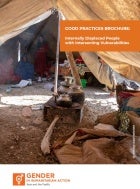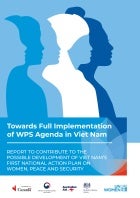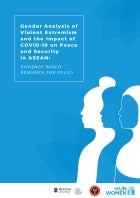1 - 20 of 43 Results
Pagination
Date:
This framework ensures that all efforts are aligned and focused on achieving sustainable change, helping to realize the vision of preventing and eliminating GBV in the country.
Date:
The ‘Gender Strategy of the National Police of Timor-Leste (2024-2028)’ was jointly developed by the National Police of Timor-Leste, with technical support from UN Women and generous support from the Government of the United Kingdom, the Government of Canada and the Government of the Republic of Korea under the UN Women ASEAN programme Empowering Women for Sustainable Peace: Preventing Violence and Promoting Social Cohesion.
Date:
In January 2024, Timor-Leste's 9th Constitutional Government approved the second phase of NAP 1325 (2024-2028) highlighting the country's commitment to Women, Peace and Security agenda.
Date:
This report delves into SGBV responses in four states: Delhi, Madhya Pradesh, Rajasthan, and Punjab. The studies reveal how legal and policy frameworks interact with survivors. Detailed findings are presented for each state, consolidated across policy design, budgeting, and implementation.
Date:
he NAP II has concrete and immediate action to provide conflict-affected with a recognition that they are conflict victims with rights to reparation and justice from the state, along with dedicated support, services and resources that allow them to rebuild their lives with dignity.
Date:
UN Women in partnership with the International Foundation for Crime Prevention and Victim Care (PCVC) developed a comprehensive resource providing district-wise details of services available throughout the state. It is primarily aimed at aiding survivors and their families in seeking essential support.
Date:
Zero Tolerance to Sexual Harassment Policy was launched in the Bogra Chamber of Commerce and Industry (CCCI) on 9 March 2022 under the UN Women’s Combatting Gender-based Violence (CGBV) project in Bangladesh
Date:
This Learning Brief reflects on the Combatting Gender-Based Violence (CGBV) project implemented by UN Women Bangladesh since April 2018.
Date:
Significant progress has been made in the second year of implementation (January to December 2022) of the project, with all annual targets achieved and 43 percent of immediate outcomes and output-level project targets already reached or surpassed, while the remaining targets are on track. The highlights of the progress and results attained by outcomes are featured in this document
Date:
This country profile provides an overview of the crisis in Myanmar, how the UN Women Myanmar team and our partners are supporting vulnerable women and girls, and our 2022-2023 strategic priorities in Myanmar.
Date:
The objective of the report is to examine the legal gaps that are hindering expenditure allocation and reporting on the landscape of expenditures on GE. Subsequently, a step-by-step roadmap has been presented to strengthen the development, implementation and tracking of gender-responsive budgets toward the achievement of national commitments to the SDGs.
Date:
This study aims to assess the status and results of the implementation of social protection for women and girls within the framework of Resolution No. 15-NQ/TW on a number of social policy issues for the period 2012-2020 in Viet Nam. The report provides policy recommendations to provide information to complete a new document on Social Policy for the period of 2023 - 2030, with a vision to 2045 and focus on advocating for gender responsive social policies.
Date:
Today there are more internally displaced people worldwide than ever; approximately 59.1 million people have been forced to leave their homes due to armed conflicts, violence or human rights violations and disasters. Evidence indicates that more than half of internally displaced people are women and girls.
Date:
Framework: Prevention of Gender-Based Violence and Harassment Against Women Migrant Workers in South and Southeast Asia
Date:
The main objectives of this report are to: a) review six NAPs to implement global, regional and national normative frameworks on WPS that can inform the NAP path for Viet Nam. More precisely, this report seeks to evaluate how the plans have intersected the pillars of the WPS agenda and how their lessons learned can be applied to the Vietnamese context, and b) to propose a feasible and effective road map for the building of a NAP for the period 2021-2030 drawing from existing Viet Nam priorities.
Date:
This report has been conducted during the first year of the ‘Master Plan on Socio-economic Development of Ethnic Minorities and Mountainous Areas 2021-2030’ and compiled by the Institute for Social Development Studies (ISDS) and the United Nations Entity for Gender Equality and the Empowerment of Women in Viet Nam (UN Women).
Date:
This report identifies both the persistent trends and changing gender dynamics of violent extremism in the context of the COVID-19 pandemic, based on an expert survey and interview research conducted between July and November 2021. It examined how and to what extent misogyny and hostile beliefs are fuelling violent extremism in the Southeast Asian region during the pandemic, the degree to which misogyny and hostile beliefs in the ASEAN region are fuelling violent extremism, and how these manifest themselves in the offline space.
Date:
The two National Target Programs on New Rural Development and Sustainable Poverty Reduction for the period 2016-2020 have achieved important results. There have been more than 6 million people escaping poverty, approximately 2 million people escaping near poverty; 62.4 per cent of communes met the New Rural Development standard. However, there are still sizable gender gaps in terms of employment, property ownership, and access to public services in rural areas, especially in poor districts.
Date:
The finance maps work much like a dating site for women entrepreneurs and finance providers. First, you open the finance map for your country. Second, simply fill out your profile, filter on what you are looking for and the map will list the finance providers that best match your business.
Date:
The WE Rise Toolkit for Accelerators consists of three tools that provide actionable steps to unlock the power of gender inclusivity for your organisation and acceleration programme. This will enable entrepreneurs from all genders to benefit equally from the support you have to offer. To implement a more inclusive and innovative acceleration programme that yields business benefits for entrepreneurs and ecosystem partners, it’s advised to applying all of the three tools.

![[cover]](/sites/default/files/styles/search_image_140px/public/2025-01/ws-c1438-english-pola-puipui-cover-960px.jpg?itok=PRIMSmmE)
![[cover]](/sites/default/files/styles/search_image_140px/public/2024-11/gender_strategy_english_draft-960px.jpg?itok=LQ1B-nZ3)
![[cover]](/sites/default/files/styles/search_image_140px/public/2024-02/tl-c636-VI-Final-NAP1325-cover-960px.jpg?itok=9RRYn-14)
![[cover]](/sites/default/files/styles/search_image_140px/public/2023-12/in-c511-consolidated-report-on-strengthening-interven-960px-2.jpg?itok=oFlgoWIX)
![[cover]](/sites/default/files/styles/search_image_140px/public/2023-11/np-english-nap-2023-960px.jpg?itok=TZapkFF9)
![[cover]](/sites/default/files/styles/search_image_140px/public/2023-10/in-survivor-support-services-directory-960px.jpg?itok=8cC9FacG)
![[cover]](/sites/default/files/styles/search_image_140px/public/2023-09/bd-bogra-chamber-of-commerce_brief-960px.jpg?itok=1pMzf-J8)
![[cover]](/sites/default/files/styles/search_image_140px/public/2023-09/bd-implementing-a-complex-gbv-ptrevention-progra-960px.jpg?itok=BSR62hKE)

![[cover]](/sites/default/files/styles/search_image_140px/public/2023-08/mn-unwomen-myanmar-country-profile-2023-960px.jpg?itok=7unIV0hV)
![[cover]](/sites/default/files/styles/search_image_140px/public/2022-12/vn-Analysis-of-GE-mainstreaming_960px.jpg?itok=T7qqazX2)
![[cover]](/sites/default/files/styles/search_image_140px/public/2022-12/vn-Social-protection-for-women-and-girls-2012-2020-EN-960px_0.jpg?itok=_3B0H-Kn)



![[cover]](/sites/default/files/styles/search_image_140px/public/2022-06/vn-ISDS_Report_DMaEMW_EN_20220530-cover-1679px.jpg?itok=fv_kbXfB)

![[cover]](/sites/default/files/styles/search_image_140px/public/Field%20Office%20ESEAsia/Images/2021/12/vn-PROMOTING-GENDER-MAINSTREAMING-ENG-1679px.jpg?itok=tAwwt8JZ)

